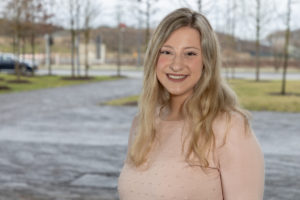
Lisa Veiber is a research and development specialist at the University of Luxembourg’s SnT. As a member of Prof. Jaques Klein‘s team for the REBORN project, she joined the Research
Luxembourg COVID-19 task force in March. The REBORN project is funded by the FNR Fast Track COVID-19 Grant.
Like everyone else, I was watching a lot of news when the pandemic began. Everywhere I looked, people were talking about numbers: about statistics of total infections in one country versus another, about the mortality rate, about the “R” value [which measures how fast the disease spreads within a population]. I’m a data freak, so I wanted to learn more about the story behind the numbers. I kept asking myself “OK, what does this really mean?” That’s what led me to join the task force. One of my overarching goals during this crisis has been to find out the stories behind all those numbers and to find ways to tell those stories accurately.
"We want it to help guide our community safely back towards normality — to help policymakers strike a balance between protecting people’s lives and protecting their livelihoods."
Lisa Veiber, SnT Tweet
As a part of the task force, our team created a way to model the performance of the healthcare sector. That model was able to simulate the impact of specific mitigation measures — like closing down schools or requiring people to wear masks indoors — on the healthcare system. This allowed us to see what was necessary to flatten the curve enough to prevent the healthcare system from becoming overwhelmed. With that model in hand, and the FNR call for proposals released, we realised we had another opportunity to meet the needs of the moment — as all eyes turned to the economy and how businesses could reopen. We decided to integrate economic information into our model, enabling it to simulate both the economic and the healthcare impact of a given constellation of mitigation measures. Taking this augmented model and turning it into a tool that policymakers can use was the logical next step. We want it to help guide our community safely back towards normality — to help policymakers strike a balance between protecting people’s lives and protecting their livelihoods.
"When making choices that will have such enormous consequences in our society, it is important that policymakers are able to really stand behind their decisions."
Lisa Veiber, SnT Tweet
Because the idea was already developed before we applied for the FNR grant, preliminary proof-of-concept is already done. Our job now is to focus on making it a reality. For me, the most important part of that is developing a way to make the model’s output not only understandable but also explainable. When making choices that will have such enormous consequences in our society, it is important that policymakers are able to really stand behind their decisions. We want users to also be able to follow our tool’s logic — to be able to explain to others why the tool is making the recommendation. This is the core area of my work on the project.

COVID-19 has taught me the humility to focus on a goal and not be afraid to ask for help to get there. Everyone has contributed so much to this project, especially Jacques Klein, Tegawendé F. Bissyande, and Salah Ghamizi. We are also working with the LIST institute, which looks into how accurately our simulation reflects the real world, and also helps us ensure that the tool is really intuitive for people who may not have a background in statistics or data science. It is wonderful to see how powerful we can be when we work together. I’ll know we have succeeded when people start using our tool to make the best decisions for our community here in Luxembourg — when it really starts to help.